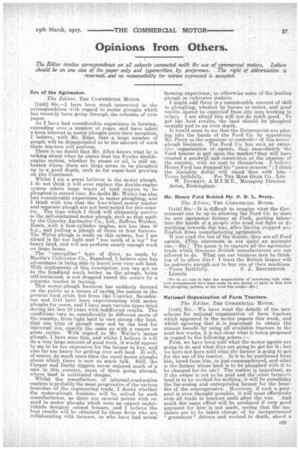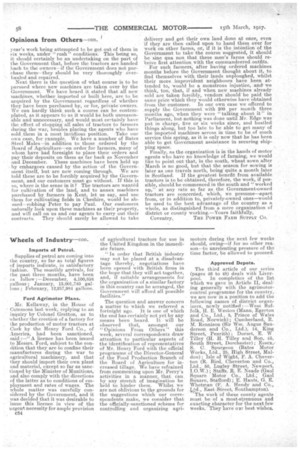Opinions from Others.
Page 15

Page 16

If you've noticed an error in this article please click here to report it so we can fix it.
The Editor invites correspondence on all subjects connected with the use of commercial motors. Letters should be on one sloe of the paper only and typewritten by prelerence. The right of abbreviallon is reserved, and no resvonsibility for views expressed is accepted.
Era of the Agrimotor.
The Editor, THE COMMERCIAL MOTOR.
[1443] Sir,—I have been Much interested in. the correspondence with regard to motor ploughs which has recently been going through the columns of your paper.
As I have had considerable experience in farming, extending over a number of years, and have taken: a keen interest in motor ploughs since their inception,: I believe, with Mr. Edge, that a large number of people will be disappointed as to the amount of work these tractors will perform.
There is no doubt that Mr. Allen knows what he is talking about when he states that the Fowler doubleengine system, whether by steam or oil, is still unbeaten where there are largo areas to be ploughed up to a good depth, such as for sugar-beet growing on the Continent.
Whilst I am a great believer in the motor plough, I do not think it will ever replace the double-engine system where large tracts of land require to be ploughed in record time. No dou'bt Mr. Waller has also had considerable experience in motor ploughing, and I think with him that the four-wheel motor tractor and separate plough are not best suited for this country. The type which I think will ultimately survive is the self-contained motor plough, such as that made b.iy the Crawley Agrimotor Co., Ltd., Saffron Walden, Essex, with a four-cylinder engine, not less than 30 lep., and pulling a plough of three or four furrows. The Wyles plough is made on this system, but I am afraid is far too light and "too much of a toy" for heavy land, and will not perform nearly enough work on large farms.
The "caterpillar " type of drive, as made by Martin's Cultivator Co., Stamford, I believe also has advantages in being able to travel over very soft land. 'With, implements of this description, you can gat up to the headland much better, as the plough, being self-contained, is not dragged round the corner by a separate tractor in turning.
This motor-plough business has suddenly dawned on the public as a means of saving the nation in the present food crisis, but firms like Crawley,. Saunderson and Ivel have been experimenting with motor ploughs for years, and I have seen various types tried during the last 10 years with indifferent results. The conditions vary so considerably in different parts of the country, from light land to very strong clay land, that one type of plough may not be the best for universal use, exactly the same as with a reaper or grass cutter. With regard to Mr. Waller's motor plough, I have seen this, and whilst I believe it will do a very large amount of good work, it would appear to me to be too expensive for the farmer to buy, and also far too heavy for getting over soft land. It will, of course, do much more than the small motor ploughs about which there is now so much talk. Still, the Cooper and Darby diggers never enjoyed much of a sale in this .country, most of them going abroad, where land is cultivated deeper. Whilst the manufacture of internal-combustion engines is probably the most progressive of the various branches of the engineering trade, 1 doubt whetteer. the motor-plough business will be solved by such manufacturers, as there are several points with regard to motor ploughs which even an expert motorvehicle designer cannot foresee, and I believe the best results will be obtained by-those firms who are collaborating with farmers, or who have had actual
farming experience, or otherwise some of the leading plough or cultivator makers.
I might add there is a considerable amount of skill in ploughing, whether by horses or motor, and good results cannot be expected from city men working in relays. I am afraid this will not do ranch good. To get the best results, the land should be ploughed straight and to an even depth. It would seem to me that the Government are playing into the hands of the Ford Co. by appointing, Mr. Perry as the organizer or controller of this meSorplough business. The Ford Co. has such an extensive organization of.. agents,that immediately the Ford taactar is put upon the market, they will have created a goodwill and connection at the expense of the country, with no cost to themselves. believe Henry Ford has dropped his "peace missioa " ; I think the almighty dollar will stand first with him.— Yours faithfully, Flo, THE MOSS GEAR CO„ LTD.
W. DUCKETT, Managing Director. Aston, Birmingham.
Mr. Henry Ford Behind Mr. P. D. L. Perry.
The Editor,' THE COMMERCIAL MOTOR.
[1444] Sir,—It is difficult to imagine what the Government can he up to allowing the Ford Co. to start its new agrirnotor factory at Cork, putting labour into the hands of a people who need not fight or do . anything towards the war, after having stopped any English firms manufacturing agrimotors. If you read the list of the depots, they are all Ford agents. fThis statement is not quite an accurate one.—En.; The game is to capture all the agrimotor trade which thesnoor British manufacturers are not allowed to do. What can our business men be thinking of to allow this ? I trust the British farnier will he patriotic enough not to buy one of their machines. --Yours faithfully, F. J. BRETHERTON. Lincoln.
[We do not eare to take the responsibiiity of interfering with what' ever aiTangements have been made by any person or party to deal with the ploughing problem of the next five weeka.—En.] National Organization of Farm Tractors. The Editor, THE COMMERCIAL MOTOR.
[1445] Sir,—We have read the details of the new scheme for national organization of farm tractors which appeared in the motor papers this week, and Whilst agreeing that it is important to obtain the utmost benefit by using all available tractors in the. next few weeks, it is not clear what is being proposed in regard to the following points :—
First, we have been told what the motor agents are going to do and what they are going to pet for it ; but we have not been told what. the farmer is going to get for the use of his tractor. Is it to be purchased from him, hired fsoni him, or just commandeered, and what is the farmer whose land is to be ploughed with it to be charged for its use'? The matter is important, as if the owner is not to be paid and theThther farmer's land is to be worked for nothing, it will be penalizing the-far-seeing and enterprisTng farmer for the benefits of the unprogressive. Moreover, if such aoprospect is even thought possible, it will most effectively stop all trade in tractors until after the war. And much the same effect will be produced if very good payment for hire is not made, seeing that the machines are to be taken charge of by inexperienced "greenhorn" drivers and worked to death, about a
year's work being attempted to be got out of them in six weeks, under " rush ' conditions: This being so, it should certainly be an undertaking on the part of the Government that, before the tractors are handed back to the owners—if the Government does not purchase them—they should be very thoroughly Overhauled and repaired.
Next there is the question of what course is to be pursued where new machines are taken over by the Government. We have heard it stated that all new machines, whether imported or built here, are to be acquired by the Government regardless of whether they have been purchased by, or for, private -owners. We can hardly think such a course can be contemplated, as it appears to us it would be both unreasonable and and unnecessary, and would most certainly have the effect of stopping all sales of tractors to farmers during the war, besides placing the agents who have sold them in a most invidious position, •Take our own case, for example. We have a number of Bates Steel Mules—in addition to those ordered by the Board of Agriculture—on order for farmers, many of whom have had foresight. to place their Orders and pay-their 'deposits on them as far back as November and December. These machines have been held up , by embargoes caused by the action 'of the Government itself, but are now coming through. We are told these are to be forcibly acquired by the Government, and our customers must go without. . If this is so, where is the sense in it ? The tractors are wanted for cultivation of the land, and to annex machines purchased by farmers in Kent, let us say, and use them for cultivating fields in Cheshire, would be absurd—robbing Peter to pay Paul. Our customers naturally look upon these machines as their property, and will call on us and our agents to carry out their contracts. They Should surely be allowed to take
delivery and get their own land done at once, even if they are then called upon to hand them over for work on other farms, or, if it is the intention of the Government to take the course suggested, it should be sine qua non that these men's farms should rebeive first attention. with the commandeered outfits.
• For such farmers, after having ordered machines months before the Government -thought about it, to find themselves with their lands unploughed, whilst their moreimprovident neighbours have been attended to, -would be a monstrous injustice, and we think, too, that, if and -when new machines already sold are taken forcibly, vendors should be paid the same price which they would otherwise have obtained from the customer. In our own case we offered to supply the Government with 200 per month three months ago, when they were "talking about it" in Parliament, but nothing was done until Mr. Edge was put in charge, five or six weeks since, and hustled things along, but too late to be able to get many of the imported machines across in time. to be of much service this spring, as it is only now that he has been able to get Government assistance in securing shipping space.
Finally, as thp organization is in the hands of motor' agents who have no knowledge of farming; we would like to point out that, in the south, wheat sown after March is no good, but that the season for sowing is later as one travels north, being' quite a month later in Scotland. If the greatest benefit from available tractors is to be obtained, therefore, the work, if possible, should be commenced in the south and "worked up," at any rate so far as the Government-owned tractors are concerned, which, we presume—apart from, et' in addition to, privately-owned ones—would be used to the best advantage of the country as a whole, as distinguished from a mere organization of district or county working.—Yours faithfully, Coventry.. THE POWER FARM SUPPLY CO.






















